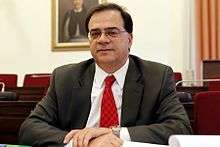Gikas Hardouvelis
Gikas Hardouvelis (Greek: Γκίκας Χαρδούβελης [ˈɟikas xaɾˈðuvelis]; born 8 October 1955)[1] is a former Minister of Finance of Greece. He replaced Yannis Stournaras on 10 June 2014 following a cabinet reshuffle.[2]
Gikas Hardouvelis | |
|---|---|
Γκίκας Χαρδούβελης | |
 | |
| Minister of Finance | |
| In office 10 June 2014 – 27 January 2015 | |
| Prime Minister | Antonis Samaras |
| Preceded by | Yannis Stournaras |
| Succeeded by | Yanis Varoufakis |
| Personal details | |
| Born | 8 October 1955 Poulithra, Greece |
| Political party | Independent |
| Alma mater | Harvard University University of California, Berkeley |
Career
Born in the village of Poulithra in Arcadia, Hardouvelis is a professor of finance and economics, Department of Banking and Financial Management at the University of Piraeus and chief economist and director of research, EUROBANK Group. He held position of the director of the Economic Office of Greek Prime Minister Lucas Papademos (November 2011 – May 2012), assisting the government during talks with bondholders about a writedown of debt and with the International Monetary Fund, European Commission and the European Central Bank on Greece’s second adjustment program.[3] During 2000–2004, he was director of the Economic Office of Greek Prime Minister Costas Simitis.
He holds a Ph.D. in economics (1983, U.C. Berkeley), and M.Sc. & B.A. in applied mathematics (1978, Harvard University). He was assistant professor at Barnard College, Columbia University (1983–1989), associate professor and subsequently full professor at Rutgers University (1989–1993).
He served as a research adviser and economist at the Federal Reserve Bank of New York (1987–1993) and as an adviser of the Bank of Greece for the next two years (1994–1995), where he also acted as second alternate to the governor at the European Monetary Institute (precursor to the European Central Bank). Between 1996 and 2000 he held the post of chief economist at the National Bank of Greece, where he restructured the Economic Analysis Division, created the Risk Management Division, the Assets-Liabilities Management Department, and the Investors Relations Department. He also played a critical role in the establishment of the Athens Derivatives Exchange, as an original member of its board of directors (1997–2000). In the subsequent years he joined Eurobank as its chief economist.[4]
Academic work
His academic work extends in finance and macroeconomics and is published in many internationally renowned journals, including The American Economic Review, The Journal of Finance, The Quarterly Journal of Economics, the Journal of Monetary Economics and others.
He was among the top-50 individual publishers worldwide in applied econometrics over 1989 to 1995. [5]
His work on margin requirements had a crucial impact on shaping the reform of the legal framework governing the markets of futures on stock indices in the US.
References
- "Gkikas A. Hardouvelis CV" (PDF). Athens University of Economics and Business. Archived from the original (PDF) on 23 September 2015. Retrieved 27 January 2015.
- "Greek PM appoints economist Hardouvelis as new finance minister". Reuters. 9 June 2014. Retrieved 9 June 2014.
- "Greece's Samaras Names Gikas Hardouvelis New Finance Minister".
- "Gikas A. Hardouvelis" (PDF). 15 October 2009. Archived from the original (PDF) on 28 June 2015. Retrieved 27 June 2014.
- "Badi H. Baltagi, "Applied Econometrics Rankings: 1989-1995", Journal of Applied Econometrics 1999, Vol. 14, 423-441" (PDF). doi:10.1002/(SICI)1099-1255(199907/08)14:4<423::AID-JAE536>3.0.CO;2-K.
External links
- Personal website
- Department of Banking & Financial Management, University of Piraeus, Greece
| Political offices | ||
|---|---|---|
| Preceded by Yannis Stournaras |
Minister of Finance 2014–2015 |
Succeeded by Yanis Varoufakis |